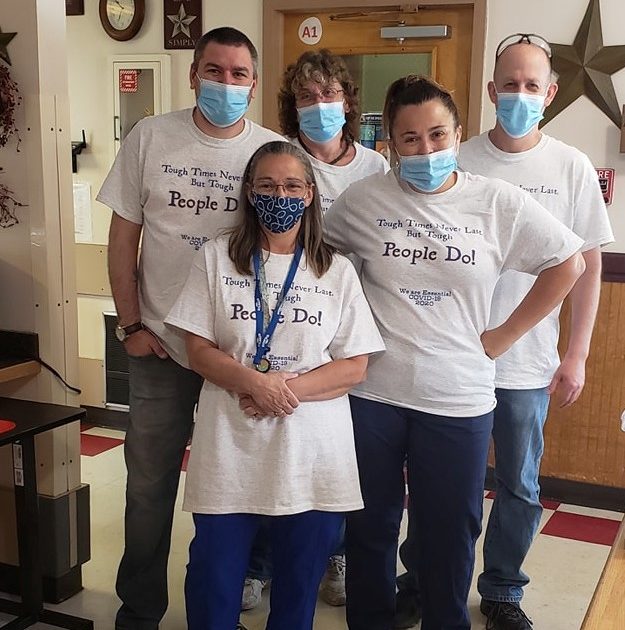Traumatic events affect us all in one way or another, even when they do not happen directly to us. An obvious example is the current COVID-19 pandemic. It has resulted in the deaths and severe illness of many people, causing great trauma for their families and friends. Additionally, dealing with the constant stress of living with the pandemic on a daily basis has traumatic effects. The stress from this particular trauma is so widespread, identifying – and knowing – how to cope with traumatic stress is more important than ever.
What is trauma?
Trauma arises from extraordinarily stressful events where there is a risk of harm (physical and/or emotional) to yourself or others. These events can leave you feeling helpless, overwhelmed, isolated, and unsafe because you have little to no control over the situation. Types of traumatic events can include:
- Natural disasters
- Violent assaults
- Terrorist attacks
- Death of a loved one
- War
- Mass shootings
- Emotional or physical abuse
- Terminal or serious chronic illness
- Major or life-threatening accidents
- Unsafe social environments (e.g. living in a high-crime area)
- Pandemics
However, there is no defined list of events causing trauma because whether an event is traumatic is defined by your emotional reaction. The intensity of your feelings of helplessness and fear will determine the level of trauma you experience, regardless of the triggering event. In other words, just because one person wasn’t negatively impacted by an event, does not mean someone else didn’t experience trauma. Also, as the list above indicates, trauma can arise from a singular event or an ongoing situation.
Responses to traumatic stress
While people do react differently to traumatic events, there are some common responses that can occur, including:
- Shock, denial, numbness, and helplessness
- Sadness, depression, and guilt
- Feeling overly anxious or constantly worrying
- Continually thinking about what happened or repeatedly reliving the experience
- Unusual amounts of anger or irritability
- Nightmares or difficulties with sleep
- Isolating from family and friends
- Headaches and digestive problems
- Loss or increase in appetite
- Inability to concentrate or feeling confused
- Increased use of alcohol or drugs
What you can do
If you are experiencing some of these responses to a traumatic event, there are a number of steps to take. Which steps to take, however, will depend on what you feel most comfortable with, and, of course, which you feel work best for you. Some possible ways to heal are:
- Face and accept the different feelings you are having, knowing that some days will be better than others
- Take things one day at a time; exercise patience with your recovery
- Stay connected to family and friends in ways that feel comfortable to you
- Maintain or establish routine in your life (e.g. consistent exercise, sleep, and nutrition)
- Try to include some form of mindfulness in your routine, such as breathing exercises, meditation, spending time in nature, or other relaxing techniques
- Limit your exposure to media, especially around topics related to the traumatic event
- Avoid using alcohol or drugs to help you manage your stress, as that can cause problems in the long run
- Keep your mind occupied to avoid dwelling on the event
- Make time to do things you enjoy or that help others (e.g. volunteering at a food shelf)
- Delay making major life decisions
- Where applicable, connect with others who have been through a similar experience
What others can do
If someone you care about has been through a traumatic event, providing support can be critical to their recovery. Support can take shape in a variety of ways, but some things to consider are:
- Just be there. Simply let them know you are there to listen. If they want to discuss the event, then, by all means, do so, but don’t push. Listen patiently and avoid any comments that could be considered judgmental. Remember, people react differently to traumatic events and the recovery process takes time. While some responses may be difficult to understand or cause you frustration, don’t take them personally; you’re speaking with someone who feels vulnerable and hurt.
- Encourage and Engage. Work with them to get their lives back in order. Encourage them to contact friends, exercise, meditate, and do other things that provide enjoyment or fulfillment and keep them occupied. Take it a step further by doing things with or for them, like going on walks together, hanging out with mutual friends, or running errands for them.
When to get help
It can be tough to know when it’s time to seek professional help, for you or for someone else. Specific signs to be aware of are:
- Increased use of alcohol or drugs to reduce or escape from the trauma
- Difficulty functioning, whether at home or work
- Feeling isolated and disconnected from others; unable to maintain or form new relationships
- Experiencing intense feelings of fear, anxiety, depression, or suicidal thoughts
- Having nightmares or flashbacks
- Increasingly avoiding things that remind you of the traumatic event
When someone is having these types of responses over a prolonged period of time, then it’s time to get help. Not doing so could result in the development of more serious disorders like acute stress disorder or PTSD.
Citizen Advocates offers a variety of services to help you cope with trauma, including eye movement desensitization retraining (EMDR), Cognitive-Behavioral Therapy (CBT), depression screening and treatment, and more. If you need help or just want to learn more, please contact us at 518-483-3261. If you need more immediate help or feel like you or a loved one is in crisis, please contact our 24-hour Crisis Hotline at (518) 483-3261 or (518) 891-5535.


 Previous Post
Previous Post

